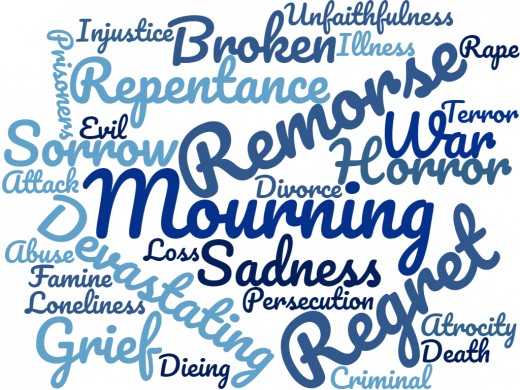The Beatitudes: Blessed Are They That Mourn

“Blessed are they that mourn, for they shall be comforted”
— The Bible ~ Matthew 5:4The Depth of Jesus' Words
Everyone wants comfort. However, for most, sorrow and regret are something to be avoided. Of course, I completely relate to that aversion. Who wants to be sorrowful and regretful?
Yet, so frequently, the means chosen to avoid sorrow & regret are the very things that exacerbate a greater need for it in our lives. So that in our struggle to shake free of that need through worldly means, we find greater pain, weightier burden, increasing sense of desperation and a hopelessness that, ironically, can only be lifted via the very thing we're trying to avoid, the pathway of sorrow and regret -- mourning.
In stark contrast, Jesus' standard for comfort requires accepting that our healing, and therefore true blessing, can only come to the one that embraces their need to mourn.
Not seek diversion or solace or escape, but to mourn.
However, there is a depth to the beatitudes that goes way beyond the simplicity of the words Jesus uses here.
What is Jesus' Meaning in this Beatitude?
Surely it was more than simply heeding the natural impulse to grieve when life delivers those devastating moments in our lives; the death of a loved one; terminal illness; unfaithfulness and divorce; war; abuse; atrocity, etc. Most would naturally mourn these events.
Jesus meant more than the patently obvious, after all, why waste words telling us to do something we would do anyway.
There is something more, then, to Jesus words here.

What's So Hard About Mourning?
Logically, Jesus is addressing something we find difficulty mourning over and, in failing to mourn, we fail to receive comfort. Just to reiterate the point, it would be superfluous for Jesus to encourage mourning over that which we naturally find it easy to be sorrowful and regretful over.
To the large crowd gathered to listen to his words, Jesus would have looked out and, possibly with divine insight, seen many hurting, scarred and suffering individuals. He may also have seen that it was a pain bottled up, unexpressed, festering within individuals that longed for comfort but didn't know how to attain it. To them a messiah was promised, one whom Isaiah (61:1-4) prophetically spoke of in this way
... the Lord has anointed me to proclaim good news to the poor. He has sent me to bind up the broken hearted, to proclaim freedom for the captives and release from darkness for the prisoners, to proclaim the year of the Lord’s favour and the day of vengeance of our God, to comfort all who mourn, and provide for those who grieve in Zion—to bestow on them a crown of beauty instead of ashes, the oil of joy instead of mourning, and a garment of praise instead of a spirit of despair.
Here was a covenant people, the Jews, unique in the world in regards their relationship with God, yet stifled by a religion that had become all about appearances. Prostitutes were considered the lowest of the low, and reviled, though we know many turned in faith to Christ. On the other hand, Pharisees were seen as the holy elite, yet we know Jesus spoke only reprovingly of them.
Like so many, they too failed to understand that God calls people to remain honest about ourselves in our pursuit of holiness, pursuing God in the stark awareness of our own ungodliness, doubt, fears and hang-ups. Not hiding those inadequacies, but expressing them. Earnest for holiness in our lives before God, while honest about our own brokenness with those with whom we share the journey.

Dishonesty Versus Mourning
Too often the mistake is made of living as if holiness requires we hide any indication of otherwise from others, especially others in the church. Wanting them to see that which we want to become, but not what we are.
Yet in hiding our true selves, we have become dishonest with one another, and we undermine one of the key reasons God established the church – so that we might be edified (improved).
I recently read a comment by a Christian woman on Facebook, in which she shared that she found the most honest people are those that are drunk. And it's often true. The world can be more honest with each other about where they're at, than Christian’s can be with each other.
Of course, the world does not care for holiness. But we should care more for honesty with one another.

True Mourning
In this beatitude Jesus calls for an attitude of mourning, of a deep emotional honesty that says;
"I will no longer deny, ignore or repress my emotional pain. I will weep my tears, groan my groans, cry my cries, and grieve my grief. For my emotions are indicators of my hearts condition and I will admit to them freely."
Now, we all understand that sin is something to mourn over, and we do, I'm sure, often. As James wrote in 4:8-10
[We] draw near to God … [we] Lament and mourn and weep! [we] let our laughter be turned to mourning and joy to gloom. [We] humble yourselves before the Lord, so that he can lift us up.
Yet even in this, we keep those sins we most struggle with a private affair between us and God. However, maybe, if we really want healing (comfort), Jesus calls us to greater honesty again, in making our mourning over sin more public. As James says:
Therefore, confess your sins to one another and pray for one another, that you may be healed.
I will no longer deny, ignore or repress my emotional pain. I will weep my tears, groan my groans, cry my cries, and grieve my grief. For my emotions are indicators of my hearts condition and I will admit to them freely.
— The True MournerYet sin is not the only thing we need to be upfront and honest about. We need to learn to go deeper. In fact sometimes we can get the horse before the cart, in being honest about our sin within ourselves and before God and maybe even publicly. But dishonest about the heartache we feel that entices us to turn to sin as a comfort. The worry that entices us to trust something or someone other than God. The pain of unmet needs that entice us to seek fulfilment in ungodly ways or in ungodly places.
King David was a man who frequently mourned over his sin. Throughout Psalms we read many accounts of this, one being Psalm 38
O Lord, do not rebuke me in Your wrath, nor chasten me in Your hot displeasure!
2 For Your arrows pierce me deeply, and Your hand presses me down.
3 There is no soundness in my flesh because of Your anger, nor any health in my bones because of my sin.
4 For my iniquities have gone over my head; like a heavy burden they are too heavy for me.
5 My wounds are foul and festering because of my foolishness.
6 I am troubled, I am bowed down greatly; I go mourning all the day long.
7 For my loins are full of inflammation, and there is no soundness in my flesh.
8 I am feeble and severely broken; I groan because of the turmoil of my heart.
9 Lord, all my desire is before You; and my sighing is not hidden from You.
10 My heart pants, my strength fails me; as for the light of my eyes, it also has gone from me.
17 For I am ready to fall, and my sorrow is continually before me.
18 For I will declare my iniquity; I will be in anguish over my sin.
21 Do not forsake me, O Lord; O my God, be not far from me!
22 Make haste to help me, O Lord, my salvation!
Yet David also recognised that God called for a greater honesty than simply confessing our sin to him and each other, in Psalm 51:6, after he had confessed, he also prayed to God and said:
Behold, you delight in truth in the inward being, and you teach me wisdom in the secret heart. (ESV)
The Contemporary English version renders the passage,
But you (God) want complete honesty, so teach me true wisdom. (CEV)

Jesus calls us to work with the deepest parts. He wants our hearts. Therefore our feelings, which are the most tell-tale indicators of our hearts condition, he does not want us to deny or repress, but to honestly address.
The church needs to be a place that nurtures such honesty, because honesty is where healing is at. The more complete the honesty with which we present ourselves to God and one another, the healthier we will become as individual members of a body, the Church. The less honest we are, the unhealthier we will become.
However, it's not pretty when people mourn. This alone can deter people from being emotionally honest; or helping those that are. There is a temptation to opt for appearance management, because its less confronting. However, when we hide our true emotions, we only encourage others to do the same; and so quench the very heart of what it means to be members of one another. (If I hit my thumb with a hammer, it doesn't try to hush it up, it screams its pain to me)
As a church, it is vital, if we truly want to find healing (as individuals and as a Body), and if we want to help others heal, then people must be permitted to be on the outside as they are on inside.
In repressing this honesty, the church, designed to seek the lost and broken, using the word of God which is sharper than any two edge sword, able to discern the thoughts and intents of the heart, has become dishonest about our own brokenness and ongoing need for healing. Such dishonesty not only presents a false front to the world, but will bind up a congregation with spiritual illness.
In fact the very first item we are told to bind around ourselves in preparation for Gods armour, so as to be effective workers for him (Ephesians 5), is Truth. I believe this is speaking primarily about inner honesty. That we must know the truth about ourselves, speak the truth about ourselves, before we can honestly rely on God to make us holy, or speak to others about their need for him.
As a church, it is vital, if we truly want to find healing (as individuals and as a body), and if we want to help others heal, then people must be permitted to be on the outside as they are on inside.
You know a soldier who goes into battle with a false concept of how good a swordsman he is, or how bad, will soon find themselves dead from overconfidence or deserting from lack of. In fact, before a Roman soldier put on any armour at all, he would first firmly wrap a wide linen bandage around his mid-section, often being helped in doing this (get the analogy here).
The bandage covered the whole area from the bottom of his rib-cage to his lower thigh, and was done for two main reasons, the first having to do with gaining greater strength and balance, the second to do with surviving a mortal wound to the abdomen. By wrapping this cloth firmly about their abdomen they gave extra support to those muscles that are so vital to keeping them upright; muscles that would play a vigorous role in the lurching, twisting, jumping, sudden movements of men fighting for their lives (get the analogy here).
So the first reason was for the support it gave. The second reason, just as practical though far from pleasant to think of, was that in the event the soldier should receive a stomach wound the bandage would prevent his intestines from literally falling out of the hole. Disembowelment. A terribly slow and agonisingly painful way to die (get the analogy here).

How many Churches, in failing to wrap the truth about themselves, failing to be honest with each other, are battling slow and agonisingly painful lives. For to go into battle wearing only a façade against a foe who knows all too well what we’re really like, will end in defeat.
This level of honesty with each other can generate some deeply emotional experiences; a spirit of mourning. Yet, for comfort to come, for true healing to take place, requires we mourn. To genuinely do that, requires honesty.
© 2013 Richard Parr



